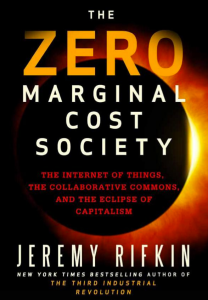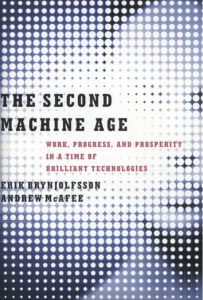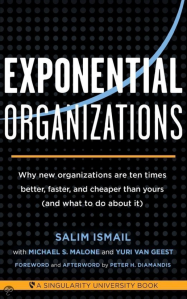Recommended reading if you want to know what is Changing Fast.
I. “Exponential Organizations”
Exponential Organizations: Why new organizations are ten times better, faster, and cheaper than yours (and what to do about it) Paperback – October 14, 2014
In business, performance is key. In performance, how you organize can be the key to growth.
In the past five years, the business world has seen the birth of a new breed of company―the Exponential Organization―that has revolutionized how a company can accelerate its growth by using technology. An ExO can eliminate the incremental, linear way traditional companies get bigger, leveraging assets like community, big data, algorithms, and new technology into achieving performance benchmarks ten times better than its peers.
Three luminaries of the business world―Salim Ismail, Yuri van Geest, and Mike Malone―have researched this phenomenon and documented ten characteristics of Exponential Organizations. Here, in EXPONENTIAL ORGANIZATIONS, they walk the reader through how any company, from a startup to a multi-national, can become an ExO, streamline its performance, and grow to the next level.
II. “The Second Machine Age”
The Second Machine Age: Work, Progress, and Prosperity in a Time of Brilliant Technologies
III. “The Zero Marginal Cost Society”
The Zero Marginal Cost Society: The Internet of Things, the Collaborative Commons, and the Eclipse of Capitalism Paperback – July 7, 2015
In The Zero Marginal Cost Society, New York Times bestselling author Jeremy Rifkin describes how the emerging Internet of Things is speeding us to an era of nearly free goods and services, precipitating the meteoric rise of a global Collaborative Commons and the eclipse of capitalism.
Rifkin uncovers a paradox at the heart of capitalism that has propelled it to greatness but is now taking it to its death―the inherent entrepreneurial dynamism of competitive markets that drives productivity up and marginal costs down, enabling businesses to reduce the price of their goods and services in order to win over consumers and market share. (Marginal cost is the cost of producing additional units of a good or service, if fixed costs are not counted.) While economists have always welcomed a reduction in marginal cost, they never anticipated the possibility of a technological revolution that might bring marginal costs to near zero, making goods and services priceless, nearly free, and abundant, and no longer subject to market forces.
Now, a formidable new technology infrastructure―the Internet of things (IoT)―is emerging with the potential of pushing large segments of economic life to near zero marginal cost in the years ahead. Rifkin describes how the Communication Internet is converging with a nascent Energy Internet and Logistics Internet to create a new technology platform that connects everything and everyone. Billions of sensors are being attached to natural resources, production lines, the electricity grid, logistics networks, recycling flows, and implanted in homes, offices, stores, vehicles, and even human beings, feeding Big Data into an IoT global neural network. Prosumers can connect to the network and use Big Data, analytics, and algorithms to accelerate efficiency, dramatically increase productivity, and lower the marginal cost of producing and sharing a wide range of products and services to near zero, just like they now do with information goods.
The plummeting of marginal costs is spawning a hybrid economy―part capitalist market and part Collaborative Commons―with far reaching implications for society, according to Rifkin. Hundreds of millions of people are already transferring parts of their economic lives to the global Collaborative Commons. Prosumers are plugging into the fledgling IoT and making and sharing their own information, entertainment, green energy, and 3D-printed products at near zero marginal cost. They are also sharing cars, homes, clothes and other items via social media sites, rentals, redistribution clubs, and cooperatives at low or near zero marginal cost. Students are enrolling in free massive open online courses (MOOCs) that operate at near zero marginal cost. Social entrepreneurs are even bypassing the banking establishment and using crowdfunding to finance startup businesses as well as creating alternative currencies in the fledgling sharing economy. In this new world, social capital is as important as financial capital, access trumps ownership, sustainability supersedes consumerism, cooperation ousts competition, and “exchange value” in the capitalist marketplace is increasingly replaced by “sharable value” on the Collaborative Commons.
Rifkin concludes that capitalism will remain with us, albeit in an increasingly streamlined role, primarily as an aggregator of network services and solutions, allowing it to flourish as a powerful niche player in the coming era. We are, however, says Rifkin, entering a world beyond markets where we are learning how to live together in an increasingly interdependent global Collaborative Commons.
Enjoy !!!
jaap van till, TheConnectivist
PS Also recommended are the 2 books mentioned before in my (Future 1) blog https://theconnectivist.wordpress.com/2015/07/21/np14-we-have-liftoff-the-network-economy-sends-wakeup-calls/
IV. “PostCapitalism” by Paul Mason V. “Peers Inc” by Robin Chase




Reblogged this on kwalitisme.
Right here is the perfect web site for everyone who really wants to understand this topic.
You know so much its almost tough to argue with you (not that I personally
would want to…HaHa). You certainly put a new spin on a topic that’s been discussed for decades.
Wonderful stuff, just great!
Pingback: The Way Ahead 1. Book: “Connectography: Mapping the Global Network Revolution” | The Connectivist